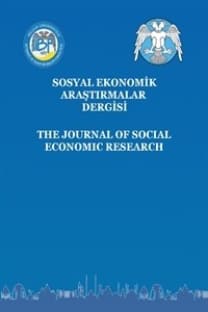GÜÇLÜ EKONOMİYE GEÇİŞ PROGRAMI SONRASI TÜRKİYE’DE İKİZ AÇIKLAR HİPOTEZİ: AMPİRİK BİR UYGULAMA*
Bir ekonominin yatırım ve tasarrufları arasındaki fark cari açık olarak ifade edilmekte iken, kamu harcamalarının kamu gelirlerini aşması sonucu oluşan fark ise bütçe açığı olarak ifade edilmektedir. Bu iki açığın kapatılması ülkeler için temel makroekonomik hedeflerden olmaktadır. İkiz açıklar hipotezi, bütçe açığı ile cari işlem açığı arasında pozitif yönlü bir ilişkinin var olduğunu ileri sürmektedir. Geleneksel Keynesyen Görüş iki açık arasında ilişki olduğunu kabul ederken, Ricardocu Eşdeğerlik Hipotezi bütçe açıkları ile cari işlem açıkları arasında bir ilişkinin olmadığını iddia etmektedir.Bu çalışmada ikiz açıklar hipotezinin Türkiye ekonomisi için geçerliliği araştırılmıştır. 2003-2013 yılları arasında üçer aylık veriler kullanılmış, Eviews programında ekonometrik analizler yapılmıştır. Yapılan analizler bütçe dengesi ile cari işlemler dengesinin birbiriyle bağlantılı olmadığını göstermiştir. Yapılan Granger nedensellik testi sonuçlarına göre bütçe açıkları ile cari işlemler açıkları arasında anlamlı bir ilişki bulunmamıştır. Bu sonuç Ricardocu eşdeğerlik hipotezini desteklemektedir.
AFTER THE PROGRAMME FOR TRANSITION TO A STRONG ECONOMY TWIN DEFICITS HYPOTHESIS IN TURKEY: AN EMPIRICAL APPLICATION
While deficit between invesments and savings is represented as current account, deficit between government expenditure and government income is represented as budget deficit. Metting this deficits is one of the main macro economics targets. The twin deficits hypothesis suggests that there is a positive relation between the budget and current account deficit. The Keynesian-traditional proposition claim that budget deficits led to current account deficits. On the other hand, the Ricardian equivalence hypothesis claim that there is no any relationship between the budget deficits and current account deficits. In this study, validity for Turkey economics twin deficit hypothesis has been ascertained. Quarterly datas period of 2003-2013 have been used. Econometric analyzes have been done by Eviews programme. Analysis conducted show that, budget deficits and current account deficits aren’t cointegrated in the Turkish case for the study period. According to the Granger causality test a relation from the budget deficits towards the current account deficits wasn’t found. The evidence seems to support the Ricardian Equavilance Hypothesis.
